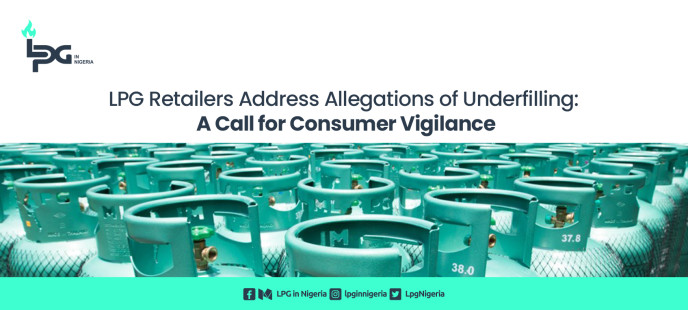- 3470
- 0
Sharing Ideas and Updates on LPG in Nigeria and related information to enable effective collaboration within the LPG Value Chain
LPG Retailers Address Allegations Of Underfilling: A Call For Consumer Vigilance

The Liquefied Petroleum Gas Retailers Association of Nigeria (LPGAR) has urged consumers to take a more active role in monitoring their gas refills while addressing allegations of underfilling in the industry. The association described the claims as unfounded and attributed consumer concerns to factors unrelated to retailers' practices.
This response comes on the heels of a report published in November that alleged widespread underfilling by LPG retailers. In a statement signed by Ayobami Olarinoye, the NUPENG Branch Chairman of LPGAR, the association acknowledged that while isolated cases of malpractice exist, these do not represent the industry as a whole.
Factors Influencing Gas Consumption
LPGAR emphasized that perceptions of underfilling are often influenced by other variables. According to Olarinoye, "The size of the family is critical in determining the volume of consumption. Frequency of use is also important in determining how long cooking gas lasts after refilling."
He further explained that many consumers focus on the duration their gas lasts rather than the actual volume consumed, leading to misconceptions about underfilling.
Unauthorized Usage and Gas Wastage
The association pointed to unauthorized usage as another factor contributing to faster depletion. "Unauthorized usage often goes unnoticed by gas owners and contributes to faster depletion," Olarinoye said, highlighting the role of children, domestic workers, or neighbors in shared housing arrangements.
Also, LPGAR identified leakages from damaged cylinders, faulty hoses, or expired regulators as significant causes of gas wastage. Olarinoye noted that many users neglect regular inspections of their equipment, resulting in avoidable losses.
Carelessness, such as forgetting to turn off burners after cooking, was cited as another major contributor to gas wastage. "This is one of the greatest causes of gas wastage," Olarinoye added.
The Importance of Monitoring Refills
The association also highlighted how forgetfulness about the last refill date often leads to misplaced blame on retailers. To combat this, Olarinoye advised consumers to weigh their cylinders before and after refilling to confirm the accuracy of the quantity purchased.
“We encourage those who can afford it to acquire digital scales to verify what they refill,” he said.
A Joint Responsibility
While LPGAR works to ensure transparency and quality service in the industry, it calls on consumers to actively monitor their gas usage and equipment. By addressing these factors, both consumers and retailers can contribute to building trust and improving the overall experience in Nigeria's LPG market.
Source: Punch News.
















0 Comment.